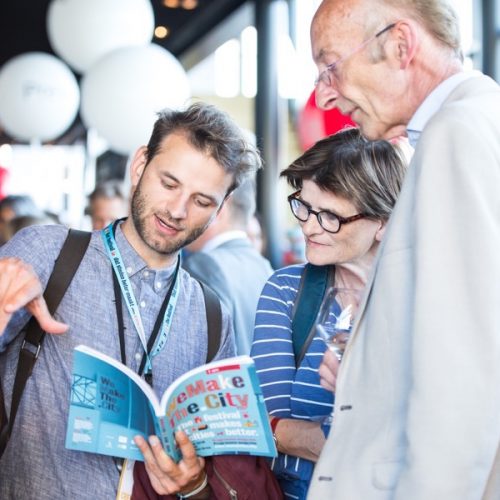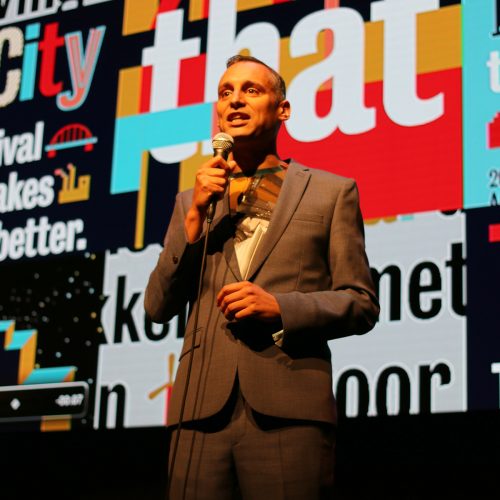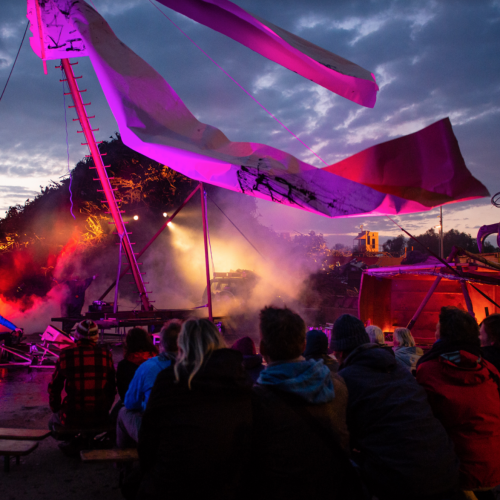Making Places
Urban ConferenceInsights in innovative approaches to area development
With a
In addition to this program participants can join a co-creation sessions, city expeditions, placemaking games and workshops which are held in the afternoon. For more information and to sign up for the urban area expeditions click here.
With the growth and transformation of cities and the surrounding landscape, we are currently facing large and complex spatial challenges. Collaboration between stakeholders is the key to success, not only to prevent conflicts during development, but also because places with a strong community lead to sustainable and resilient areas. Every speaker in this programme uses innovative tools within area development. It’s very special to see all of these tools combined in our programme setup. We start with a number of inspiring keynote speakers. After their introduction we will enter into a dialogue with each other using a horizontal exchange of knowledge. Our goal is to inspire and to learn from each other, so that we can build better cities.
KICK-OFF BY
• Senior Vice President of Project for Public Spaces Ethan Kent supports organisations, projects and leaders in placemaking worldwide: a method to work with users to improve public space. He speaks about placemaking as an intrinsically co-creative practice in the design and management of public space.
• Area developers play an important part in the creation of the living environment. Director at area development company AM Peter Heuvelink tells us more about the ‘I AM YOU’ principle, in which AM collaborates with stakeholders on concept development, innovation and co-creation.
• "Our city faces major challenges in the areas of urban development, sustainability and the transition to a gas-free city.” Marieke van Doorninck is the alderman of spatial planning, land-use, sustainability, climate and energy and will share her vision on the city of Amsterdam.
DIALOGUE
• Founder/director of TransformCity, Saskia Beer, decided to thoroughly redefine her role by unsolicitedly initiating local projects to make the city more attractive, inclusive and resilient. She will tell us more about her projects and about Transformcity, a complete toolkit for collaborative urban development aimed at growing a sustainable and inclusive local community of co-owners.
• Martijn Rengelink is director of The Attractive City and Mobility for the Municipality of Almere. He will speak about his experiences in developing Oosterwold, a radical self-build city between Almere and Zeewolde.
•“A creative city is one that is not only efficient and fair but also able to foster creativity among its citizens and provide emotionally satisfying experiences for them.” Charles Landry is an author, speaker and international adviser on the future of cities best known for popularising the Creative City concept.
• How do you ensure that a building, city square, park, community or city is – and continues to be – appealing? How do you create a place with a distinctive, positive and enduring image? Rozemarijn Stam from BRAND The Urban Agency developed a place branding principle and will tell us more.
• Chantal Robbe knows everything about public-private partnership contracts and for citizens’ initiatives with a range of tasks that vary from concrete location development to abstract spatial strategies. She tells us more about urban area investment zones and other calculation models that used in area development.
• Enthusiastic citymaker Michel Vogler is the initiator and developer of halloijburg.nl and gebiedonline.nl. He tells us more about Gebiedonline, an online platform in co-operative management by the inhabitants to improve the quality of life in their neighbourhood.
• Partner and founder of Stipo and author of the book The City at Eye Level, Hans Karssenberg is involved in urban area development, urban strategy, processes of co-creation and self-organization, vision and concept development and placemaking. He tells us more about the transformation of Rijnhuizen in Nieuwegein, which was gradually developed in cooperation with more than 100 stakeholders.
• According to Fulco Treffers – Owner of 12N Urban Matters – stones only come to life if they have meaning for the people who use them. He tells us more about his award-winning Space-S project in Eindhoven, where 402 rental properties have been developed in consultation with the future residents.
• Professor at the Lectorate of Play and Civic Media Martijn de Waal is a writer and researcher focussing on the relation between digital media and urban culture, with a specific interest in public space. He will tell us more about The Hackable City, a research project on collaborative citymaking in the Network Society, and Design & The City.
• Ekim Tan, founder and director of Play the City, designs physical games as a method for collaborative decision making. They use gaming as a problem-solving method, bringing top-down decision makers together with bottom-up stakeholders.
• Gerard Roemers is senior consultant at Metabolic. He uses his multidisciplinary background to discover the leverage points by which the material- water- and energy cycles in regions and cities can be closed. He is also engaged in strategic consultancy with a focus on systemic interventions within different sectors of the global and regional economy.
• Gordon Douglas is author, assistant professor of Urban Planning and director of the Institute for Metropolitan Studies at San José State University. He is a multidisciplinary urban planner working on the cutting edge of economic policy, economics, community studies, planning and design. Douglas wrote, among other things, the book ‘The Help – Yourself City’, about citizens who take matters into their own hands.
This programme is free of charge, please sign up by clicking on the 'Buy Tickets'-button on the top of the page. It is possible to purchase a vegetarian lunch which will be served after the programma in Pakhuis de Zwijger.
Friday 22 June
09:30 - 12:30
Pakhuis de Zwijger, Piet Heinkade 179, 1019 HC, Amsterdam


